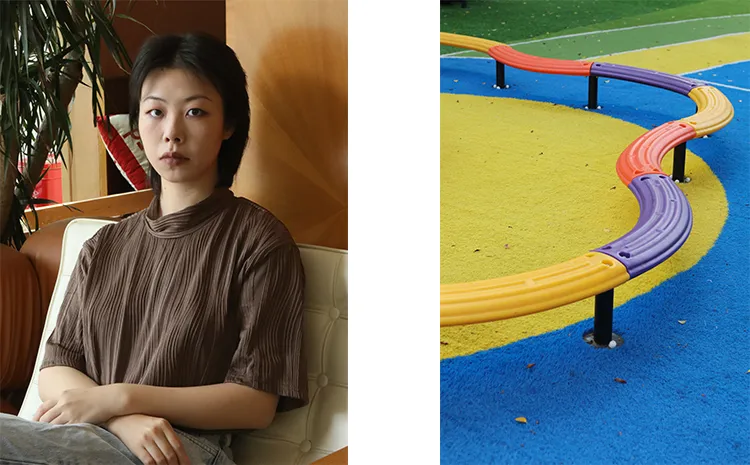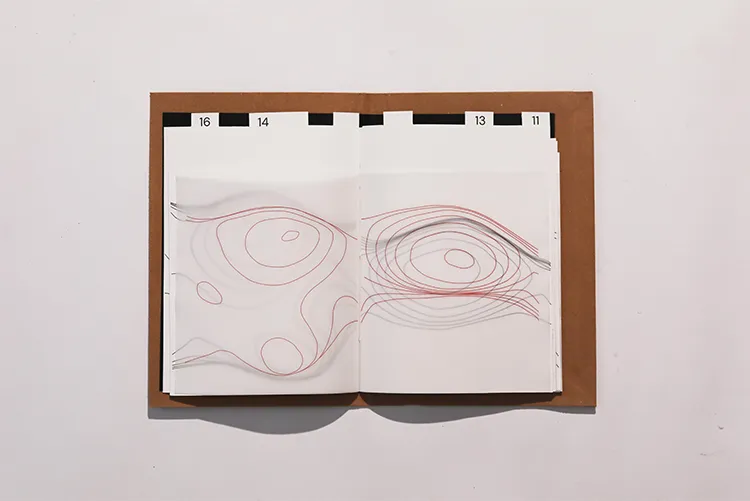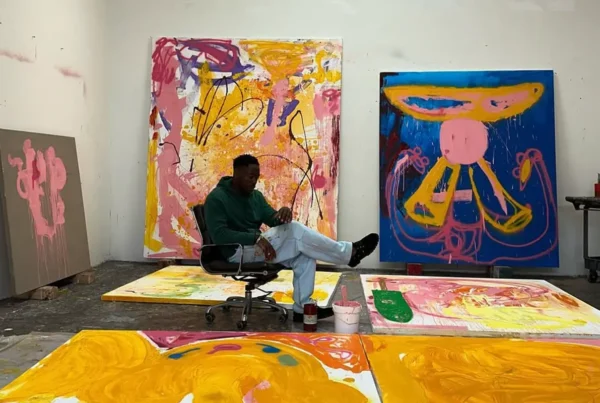“My body felt like a social sculpture, marked and shaped over time, but through performance, I saw it beginning to morph and reshape.”
Erica Zhan: Shattering the Boundaries of Professionalism in Art
Erica Zhan, a Chinese-born interdisciplinary artist and writer based in Chicago, is redefining the relationship between artistic creation and professionalism. Her practice traverses performance, photography, video, and text, addressing the societal structures that govern competition, training, and play. Zhan’s artistic career is anchored in her unique ability to critique these systems while inviting audiences to engage with art in an unexpected, often playful manner. Central to her work is a desire to break away from standardized norms, presenting herself as an “alternative player” who challenges the rigidity that pervades contemporary art and social expectations.
Zhan’s transition from a background in business and communication to an outsider in the art world has allowed her to develop a distinctive approach to her creations. Her understanding of systems, combined with the ability to step outside conventional frameworks, enables her to explore deeper layers of meaning in her work. She draws upon research and intuition, emphasizing the role of the body as a tool for expression. Through this lens, Zhan’s practice becomes an exploration of the human condition, navigating the tensions and contradictions inherent in modern life, where competition and standardization reign supreme.
Zhan’s work not only explores personal authenticity but also creates space for audiences to question their own roles within societal systems. By pushing against the constraints of professionalization, she invites a reconsideration of what it means to play, both in art and in life.

Erica Zhan: Discovering the Power of Performance Art
Erica Zhan’s artistic journey began with a desire to strip away the societal layers that had shaped her, seeking to find truth within herself. Performance art, a medium she had once approached with disinterest, became the key to unlocking her artistic voice. Zhan discovered an intimate connection with her own body through the act of performing, using movement and interaction with others to explore space in ways that had previously eluded her. This newfound engagement with her body created a sense of release and transparency, allowing her to confront the physical and emotional imprints of her past.
This epiphany was particularly poignant for Zhan, whose history of tension toward her body had been deeply influenced by societal conditioning. In performance, she discovered a way to reclaim her body as a form of “social sculpture,” an entity shaped by experience but also capable of transformation. By placing her body at the center of her work, Zhan exposed herself in a raw, unfiltered manner, revealing layers of her identity that had previously remained hidden beneath societal expectations.
Performance art became the foundation of Zhan’s practice, serving as a medium through which she could navigate her own truths while challenging the systems that constrain others. Through her participation in Chicago’s vibrant performance art scene, Zhan continues to evolve her practice, using her body as both subject and object to question the roles we play in society and the structures that define them.

Reclaiming Play: Games, Sports, and Satirical Art
At the heart of Erica Zhan’s work lies a playful critique of competition and standardization. Her artistic practice is centered around the concept of play, questioning the role of games in society and their relationship to professionalism. Zhan approaches her work with a sense of humor and satire, deliberately provoking the structures that govern how we approach competition and success. She often asks: Can games exist without competition? Is it possible to separate desire from predetermined outcomes? These questions drive her exploration of themes ranging from sports to medicine, inviting viewers to consider the joy of amateurism in a world dominated by professional expectations.
One notable piece, “Faster, Higher, Stronger,” exemplifies Zhan’s approach to these themes. In this performance, she creates three “tournaments” based on the criteria of speed, height, and strength, using everyday objects to reframe the seriousness of international sporting competitions. By removing the pressure of winning, Zhan’s work transforms the idea of competition into something absurd, encouraging the audience to question the values we assign to success and failure. This subversion of traditional standards is a hallmark of Zhan’s practice, using playfulness to expose the deeper mechanisms at work within societal systems.
Through her use of humor and absurdity, Zhan offers a refreshing take on the pressures of achievement, allowing her audience to reconsider the importance of play and creativity in their own lives. Her work encourages a return to the fundamentals of play, where joy and exploration take precedence over outcomes, and where rules can be bent to reveal the hidden dynamics of power.

Erica Zhan: Danger, Performance, and Artistic Influence
One of the most significant moments in Erica Zhan’s artistic development came before she even began her performance practice. While writing a review of Chinese artist Li Binyuan’s exhibition, Zhan was struck by the raw intensity of his performance piece, “2CM.” The piece involved Binyuan standing just two centimeters from a running chainsaw, operated by his own mother. This visceral interaction between human vulnerability and industrial danger left a profound impact on Zhan, sparking her own fascination with the concept of danger within art.
For Zhan, this encounter with danger became a key element in her performance practice. She continues to draw inspiration from this early experience, weaving themes of risk and vulnerability into her own work. Performance art, for Zhan, is not just a medium of expression but a way to confront the perilous boundaries between control and chaos, tranquility and danger. The emotional resonance she experienced while watching “2CM” continues to echo through her own performances, where she invites audiences to witness her body navigating similar tensions.
Influenced by scholars and figures such as Johan Huizinga and Stewart Brand, Zhan’s practice is also deeply informed by the philosophical underpinnings of play and freedom. Her work reflects a longing for liberation from the confines of professionalism and efficiency, drawing upon countercultural movements that advocate autonomy and resistance. Zhan’s ability to connect these influences with her own personal experiences of performance creates a layered, deeply thought-provoking body of work that continues to evolve as she pushes the boundaries of artistic expression.






